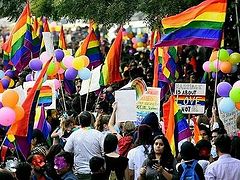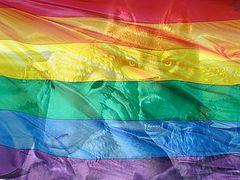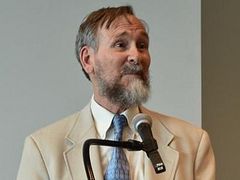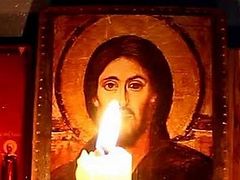In the wake of the recent conference organized in Oxford, England by Fordham (The Jesuit University of New York) University’s Orthodox studies employees on “Bridging Voices” between LGBT+ and traditional Orthodox people, a particular thread has appeared that is gaining credence through spinoff articles and comments. I first saw it in an article by Fr. Lawrence Farley, and followed it back through Rod Dreher’s article on The American Conservative to the source, which, as Rod Dreher cited, is Nik Jovcic Sas, a “Queer Serbian Orthodox LGBTQ+ activist, violinist, drag queen, vampire & vlogger” (self identification from his own Instagram page), who spoke at the Oxford England conference. The postulate is this: “There is terrible violence being inflicted against gays in Eastern European (Orthodox) countries. The clergy is doing nothing about it, even encouraging it. Russia is the worst.” The spin is off and whirling, and it looks like it has some otherwise very sober people if not livid then scratching their heads with indignation.
Rod Dreher’s article was excellent in our humble opinion, and invited, as could be expected, “dialogue”. One reader sent him a reply, which so shocked him that he based a follow-up article on it. The reader wrote to confirm Jovcic Sas’s report on terrible violence against gays in Eastern European countries. He says that he has been living in one for a number of years, and has his own horror stories to tell. Rod Dreher published the letter, intentionally concealing the writer’s identity and country of residence in order to protect him from possible reprisal against his own person, presumably for simply having the nerve to talk openly about what is going on (and of course because his story was rather personal in spots). This of course only increases the alarm, because it implies that there are people in his country of residence who are watching his every move, even reading Rod Dreher’s column in order to catch him up and then pounce on him. I am not criticizing Mr. Dreher for this; I would only say that it leaves many questions in our minds. First of all, which country? They are certainly not all alike. The reader’s line, “[The people in that country] blame the collapse of the economy and the nation after the fall of communism in the 1990s and all of the troubles that ensued (a very painful issue for everyone) on the supposed presence of gays in the country”, rings a strong bell for the answer, “Russia”. It is the only country out of the Eastern Bloc that talks about itself in that context; all the others usually blame either Russia or the EU. And communism fell earlier in other Eastern Bloc countries. This is my own inductive reasoning, and he may be living in some other Orthodox country; however I myself have been living in Russia off and on since the early 1990’s, I know the Orthodox milieu there well, and so I am going to focus on that country—especially since the Pew research to which Mr. Jovcic Sas refers says that Russia is the worst. So, let’s talk about the worst.
Another question that arises is: Is the man who wrote the letter to Rod Dreher gay? We can’t know, and his orientation wouldn’t really argue for or against the validity of his charges against the Orthodox countries, but there could be implications that he is a participant the LBGT agenda. This question arises also because people who are not gay in Russia simply are not seeing or hearing about the violence. It would mainly be known by the LBGT themselves, the perpetrators of violence, and of course the criminal justice system. Since practicing Orthodox Christians do not involve themselves in Neo Nazi violence (in fact very few people in Russia are Neo Nazis), your ordinary church-goer knows very little about it.
But is that the only reason they know very little about it? Let’s look more closely at the actual numbers involved. Without actually perusing the criminal records of the major Russian cities we are unlikely to come up with a hard figure on attacks against individual gays just because they are gay, but that is our focus. This means that we will not be citing incidents involving attacks on LBGT activists while they were conducting protests, or as in most cases, trying to have a Gay parade or demonstratively violating the Russian law against LBGT propaganda to minors. That is where we would get the lion’s share of physical attacks on gays or LBGT activists, because by such actions they are basically throwing down the gauntlet to people who strongly disagree with them; but the issue here is plainly the Orthodox Church’s supposed homophobia and hatred of gays that leads to violence. The clergy and faithful in Russia have not physically attacked gay paraders, they have only stood up against such parades as promoting something absolutely antithetical to our Christian morals and beliefs and therefore completely destructive of Christian society. (Moreover, Gay parades are banned by law in most large Russian cities, so—no attacks!)
But whatever the case may be, I’ve decided to suppress my natural revulsion against Jovcis Sas’ irreverent YouTube channel avatar (a head wearing a red balaclava, provocatively reminiscent of a devil, with a small icon of the Mother of God held strangely over its mouth) and rise to Dreher’s reader’s challenge to watch the video for myself. After all, leaders and members of the Orthodox Church, the Church I belong to, that is, my brothers and sisters in Christ have featured this “Orthodox provocateur” in a supposedly Orthodox conference. So, here is what I found.
Jovcic Sas says that in his observation, the Orthodox Church in Eastern Europe and the Balkans has taken “an impenetrable reactionary response against the push for equal human rights”. This is as opposed to Oxford University, which is engaged in “dialogue”. The implication here is that Oxford University is somehow the light for us Orthodox Christians to follow, and not the clergy of nations with 1000+ years of history in Orthodox life, moral teaching, and pastoral theology. These clergy are simply reactionary—in other words, their reaction is not what promoters of the new “morality” want. Let’s also take apart the idea of “equal human rights”. Are the Orthodox really against equal human rights? Don’t the Orthodox who are not falling for Jovcic Sas’s smooth talking and his fellow activists have human rights as well? It goes without saying that no one has the right to commit a crime against anyone. Criminals are subject to sentencing and punishment. But are practicing Orthodox Christians committing crimes against gays? Or are they simply standing up for their own “human rights”? He says that, “where there is violence, there cannot be pastoral care.” So, let’s suppose that all violence against LGBT+ is somehow miraculously stopped. Unfortunately, we still have quite a lot of violence left in society. Does the rest of the violence remove all possibility of pastoral care?
 Fr. Andrew Nikolaev and his family, who perished in an fire in their own home, set by an arsonist who has made numerous threats against them previously. The police did not respond to the priest's call for help after the threats. For example, violence against priests. Orthodox Christians in Russia are quite aware of the numerous attacks against Orthodox priests in Russia that have been perpetrated even after outright persecution against the church by the previous regime has stopped. Although there have been dozens of cases, you can read about a few of them here, here, and here. A more comprehensive list can be found here. These are stories lying on the surface of a Google search for “priests murdered in Russia”. That is only Russia—we will not even get into all the violent acts against priests and their families in Ukraine being perpetrated by those who are pushing the new “church” backed by our wonderful human rights activists in the West—hugely disproportionate to any attacks on LGBT in that country. But although it cries out for comparison with the supposed pervasive violence against gays, that is another story entirely and should be talked about separately.
Fr. Andrew Nikolaev and his family, who perished in an fire in their own home, set by an arsonist who has made numerous threats against them previously. The police did not respond to the priest's call for help after the threats. For example, violence against priests. Orthodox Christians in Russia are quite aware of the numerous attacks against Orthodox priests in Russia that have been perpetrated even after outright persecution against the church by the previous regime has stopped. Although there have been dozens of cases, you can read about a few of them here, here, and here. A more comprehensive list can be found here. These are stories lying on the surface of a Google search for “priests murdered in Russia”. That is only Russia—we will not even get into all the violent acts against priests and their families in Ukraine being perpetrated by those who are pushing the new “church” backed by our wonderful human rights activists in the West—hugely disproportionate to any attacks on LGBT in that country. But although it cries out for comparison with the supposed pervasive violence against gays, that is another story entirely and should be talked about separately.
The speaker goes on to say that with newly found freedom, the formerly persecuted Christians before the reign of Constantine the Great began to persecute pagans and heretics after Constantine the Great. Whether this is a chronological oversimplification, a lack of historical knowledge, or an intentional obfuscation, we don’t know. But it doesn’t take much investigation to learn that the Church under Constantine the Great did not persecute pagans, nor did it persecute heretics. To be sure it struggled against heresy on the ecclesiastical level. I think that this historical context to the contrary highlights the difference between keeping the Church theologically pure while protecting the faithful in society from harmful influences, and random violence against the “different”. It should not have to be emphasized that the Orthodox Church was not responsible for the Spanish Inquisition.
He says that the Orthodox Church is creating a hostile environment for the “new pagans and heretics”—gays. But is the Orthodox Church creating that environment, or was it already there? It’s interesting to note that communism was a leftist political project. So, arguably, is the LGBT movement. But the laws in the USSR were much harsher against homosexuals. It was crime punishable by imprisonment. And woe to the imprisoned homosexual… With the Church’s newly found freedom in Russia, the homosexuals also found new freedom—laws banning their very existence were stricken from the penal codes. In fact, attacks against them are just as much a crime as attacks against priests, or anyone else for that matter. And attackers, when caught, are sentenced.
Jovcic Sas cites a few cases of attacks on gays in Russia, one of them with particular shock value: A human rights activist, Elena Grigorieva, was stabbed repeatedly in the face and the back of the head. He sites the website “Pila protiv LGBT” (Saw against LGBT”), which had her listed as a target for violent death. Jovcis Sas is of course using this as an obvious example of homophobic violence in Russia. But let’s look at this more closely. Although there were numerous of articles covering this story in the Russian press, I’m only going to cite “Svoboda.org”,1 because it is one of the most pro-western, anti-Putin sites in the Russian language, and is furthermore funded by Western sources.
I could not look at the “Pila” website to find Elena Grigorieva’s name on the list, simply because that site has been banned in Russia by the federal law against extremism. That is not to say that there was no one who hated her enough to kill her. After her participation in a “rainbow flashmob”, she received repeated threats from a certain Timur Bulatov. Now I know it’s not good to profile people, but Timur Bulatov is not a Christian name, let alone Orthodox. It is a typical Muslim name—you could probably find hundreds of them in the Russian Federation. How did the Orthodox Church create his hatred?
Elena Grigorieva had only been an LGBT activist for a few months before she was murdered. She had been an activist long before that for other causes such as, “no taxes on truck drivers, and against military action in Ukraine. She was well known as an activist. Her lawyer Maxim Olenichev, who had had helped her file complaints to the police about the threats, said that it was hard for him to say why the civil activist was killed. “It could be hatred based on her political convictions, it could be homophobia, or it could be a family conflict—all of these possibilities have to be explored, and the guilty parties have to be found and convicted… So far there are no facts that would prove any one of these versions.”
The human rights defender Dinar Idrisov, who had followed the evolution of Elena’s social network posts from the beginning of her activist career, came to the conclusion that “in recent years, she diametrically changed her political views… She had come in amidst the activists on a wave of moderate nationalistic interests, but then came the annexation of Crimea, the war in Donbass, and she left the nationalists and entered the liberals… A year ago Elena separated from her boyfriend Andrei, and announced that she was bisexual. But she continued her contact with her former co-warriors, who clearly did not sympathize with her new convictions. She complained to her friends from Solidarnost’ [he new, liberal group] that she was being threatened and accused of defection…”
Elena had begun to say in her posts that she was sure she would be killed, but as Idrisov said, “Against the background of her usual hyperactivity, emotionality, and the many petty threats, no one took her seriously… It is the same situation as with domestic violence—there is no system here that would protect victims of minor violence against their escalation into them becoming victims of more serious violence…”
One of her friends says that she has no doubt that “her murder was motivated by hatred, but what provoked it is unclear—there could be many reasons.” In her hometown of Novgorod she had participated in demonstrations, but the organizers had been accused of wearing Nazi symbols and punished. It turns out that they were not wearing Nazi symbols, but organizers of liberal demonstrations are not accused of such things, only nationalist extremists. In Petersburg she met her boyfriend whom she later left for a lesbian, and friends say that he was not happy about that, to say the least.
 Activist Elena Grigorieva held by the police at a protest. So, we are looking at a person who lived a tumultuous life, who was killed after engaging in LGBT activism, but about whom even her friends and legal support cannot say for sure that she was killed because she was bisexual and supported gays. The media has often shouted loudly about people who were murdered supposedly because they are gay, while information showing that they were murdered for other unrelated reasons somehow never makes it to press.2 But whatever the case may be, where does the Orthodox Church figure in here?
Activist Elena Grigorieva held by the police at a protest. So, we are looking at a person who lived a tumultuous life, who was killed after engaging in LGBT activism, but about whom even her friends and legal support cannot say for sure that she was killed because she was bisexual and supported gays. The media has often shouted loudly about people who were murdered supposedly because they are gay, while information showing that they were murdered for other unrelated reasons somehow never makes it to press.2 But whatever the case may be, where does the Orthodox Church figure in here?
Clearly the Orthodox Provocateur is not interested in subtleties. The woman was killed + she was an activist for LBGT rights + it happened in Russia + Russia is an Orthodox country = there is very much violence against gays in Russia and it is the fault of the Orthodox clergy who are standing in the way of equal human rights. I think anyone can see the problem with this equation. Jovcic Sas also cites other extremist groups that have likewise been banned, their leaders arrested and imprisoned, as if they were hand in glove with Orthodox faithful. He says that according to the Levada Center, one in five Russians feel that homosexuals should be liquidated. The Levada Center is not specifying that one in five Orthodox Christians feel that way. Furthermore, the same center has also shown that only 80 percent of the population of the Russian Federation consider themselves Orthodox, and of those, only 5 percent actually go to church on a regular basis. Let’s not forget that the survey was of everyone in the Russian Federation, which includes Moslems, who comprise 6.5 percent of the population. Also don’t forget that Chechnya and Dagestan, overwhelmingly Moslem republics, are also part of the Russian Federation. So does the statement, “One in five Russians think homosexuals should be liquidated” really say anything about the Orthodox Church creating a hostile environment? And does Patriarch Kirill’s saying that the acceptance of homosexuality is an indication of the world being close to apocalyptic times anything other than a distilled version of the Church’s teaching? This theme runs throughout the New Testament. (See 2 Pet. 3:3; Matt. 24:12; 2 Tim. 3:1-5; 2 Pet. 3:7-12; Lk. 17:28-33; 2 Tim. 3:13; 1 Tim. 4:1; Jude 1:16-19, to name but a few passages.)
Well, since the Russian clergy are on the seat of the condemned, I think it’s only fair to ask a few of them their opinion. We have asked two priests in Moscow what their view is on the question of homosexuality and the Orthodox Church? This is a subject that many priests usually do not like to talk about, not because there is a “wall of silence” as Jovcic Sas says, but because firstly, they are not supposed to talk about pastoral council they give to people who come to them, and secondly for the reason that the apostle Paul cites: It is a shame even to speak of those things which are done of them in secret (Eph. 5:12). When one hieromonk was asked whether this was something that came up frequently, he said that about one in 500 bring it to confession. He stated briefly that the key is whether or not they are really repenting. If there is no repentance, then according to our Church canons and pastoral rules, they cannot be admitted to Holy Communion. About the rest he remains silent, because they are living human beings who recognize their fallenness, and it is a pastoral issue.
In listening to Jovcic Sas’s talk, it is chilling to hear how he categorically rules out the option of repenting of the sin in question. He states that he knew he was gay from the age of nine (we have to insert here that this is a case for the psychiatrists. At what age can a person really decide, for the rest of his life, that he is a homosexual?). He also tells us about his adventure in Moldova, where he went to an exorcism—not in order to repent and be healed, but so that he could show us later how horrible the experience was and how backward the folks are there. He snidely says that the exorcism didn’t help and he is still gay—a statement that was met by sardonic laughter from the audience at the “Bridge” conference, something that left me with a very uncomfortable impression. But if he was not going to the exorcism to be healed but rather to mock it, is it any surprise that the demon he has befriended and willingly harbors did not leave him? (By the way, an exorcism is a form of dialogue with demons. There you have it—Orthodox dialogue! In Christ’s words, it basically says, “get thee behind me satan.”)
Another aside; there is a well-known British, Catholic man named Milo Yiannopoulis (his grandmother with whom he lived after the breakup of his family was Greek, and he took her name). He is a curious mix—a practicing homosexual who is an activist for traditional family and heterosexuality. He gave an interview to LifeSite News, in which he comes very close to admitting that he considers his proclivity to be a sin, but when asked point blank if he would give it up for Christ’s sake he says, “I’m not there yet.” He is nothing if not honest. He most emphatically states that the propaganda that homosexuality is nature rather than nurture is the “big lie”, which does a great injustice to those struggling with it. He himself was sexually abused by a Catholic priest during his puberty years, and although his message is that one has to get on with life, it is pretty clear from the interview that he feels something drastically has to be done about this problem. He adds that statistically, homosexual men make up the vastly disproportionate number of pedophiles.
Which brings us back to the Russian law against homosexual propaganda to minors. What would a lecture about violence against homosexuals be without a snipe at the Russian law forbidding homosexual propaganda to minors? Jovcic Sas characterizes this law as a tragic barrier against talking with minors about why it’s okay, even good to be a homosexual. But that law was passed after taking the latest studies on homosexuality into consideration. So, no, as long as that law in enforced, there is some hope in Russia that nine-year-olds will not be deciding they are gay,3 and homosexual instructors will not be allowed to indoctrinate thirteen-year-old boys in the “new morality”.
Jovcis Sas also talks about Georgia, Macedonia, and Serbia, but these countries are beyond the scope of this article. Besides, as we said, Russia has the lowest Pew rating so we are talking about Russia—the greatest example of clerical obscurantism, as the communists liked to say.
It takes just a little searching to see that Russian Orthodox priests are not categorical about the problem. There are homosexuals in Russia, and there are youths who have “come out” and are bullied in social networks. They do not dominate the numbers of youths who are bullied on social networks, but we’ll cite the responses of priests in an article by Pravmir on this trend entitled, “Can Homosexuality be ‘Cured’?”
Archpriest Alexei Uminsky commends a Jewish father, who had always mocked gays, for still loving his son who has announced his orientation.
Archpriest Alexander Ilyashenko says that a sinful persons needs compassion. “This is a tragedy for the family—both for the boy himself, and his parents. It is very hard when some one you love is sick not only physically but also morally, that is, he commits sins. However, this is not the sin of one family, but the result of the sinfulness of the whole society, which is passed on to young souls that have not yet been strengthened in maturity… Any sin is not a norm, but a distortion of human nature. The Church looks at sin precisely as a sickness, which can be healed through faith in God, repentance, and prayer.”
Archpriest Andrei Lorgus, also a psychologist, says that no one is doomed to a life of homosexuality. “The overwhelming majority of literature on this subject contains the lie that homosexuality is an inborn inclination, that it is ‘nature’ [rather than ‘nurture’]… In fact, this is far from true… it is the result of psycho-social teaching, childhood history, and age of puberty.
“We also have to understand that it’s not a mental illness but a personality disorder. It is not a matter for the doctors, because there is essentially no psychiatric component…
“It is important to remember that there are in fact very few homosexuals who actually act out their choice. We see in society a homosexual informational campaign that artificially inflates what is literally a minority. For example, there are far more people in our society who suffer from diabetes or claustrophobia. Not one of these ‘minorities’ conducts such active propaganda or tries to push upon society habits, traditions, or forms of behavior that are alien to it.
“It is a sign of our times, because homosexuality has existed for a long time, but this has never been a central cultural-ethical question. After all, the percentage of these people who practice their homosexual inclinations in no way corresponds to the scale of discussion that is going on in society—first of all in the media.”
Fr. Andrei’s discussion merits a separate translation in full, but in sum, he says that any violence or force is a crude mistake.

Priest Dimitry Sverdlov says that the vast majority of homosexuals are what is called “social homosexuals”, and the problem is usually rooted in the family. “For such people, their sexual identification is a form of protest, and often precisely against their families… It is not only the person’s internal problem, but also problems in the society in which that person is located.”
He brings us to the question: “Is such a person a member of the Church?”
“Once I confessed a homosexual who understood the sinfulness of his orientation. This man went to church, and experienced a penitential disposition. Despite the fact that before this confession he had not practiced such a relationship, he understood that the attraction lived in him. And this bothered him very much…
“I can’t recall how it all ended—he wasn’t our regular parishioner. I don’t remember whether I allowed him to receive Communion, or whether the possibility was even discussed. But it seemed to me that a man with such a disposition, who recognizes his sin and repents of it, is truly a member of the Church. His repentance makes him a member of the Church…” (This would imply that the reverse is true: If someone absolutely refuses to repent, can he really be a member of the Church?)
“Any sane priest would remind a parent of the commandment of love, of the need to show love for his son, no matter what the son does…” He says that children often protest because their parents tried to see them as their “property” and use despotic methods of childrearing. “The child belongs to God. And the parents’ passion of pride and anger will lead to the child trying to “show” himself; [these methods] become destructive—for the child’s soul, for the parents, and for their relationship. And such things sometimes lead to just such monstrous forms of protest in the child as this.”
I’ll leave it up to the reader to decide whether these pastors are creating a hostile environment that would lead to violence against homosexuals.
But there is one last response that likewise must be mentioned. Another hieromonk we asked, Fr. Cyprian, answered in a sort of parable that is actually a historical fact.
 Apotheosis of War by Vasily Vershagin. Photo: Wikipedia. https://en.wikipedia.org/wiki/The_Apotheosis_of_War#/media/File:Apotheosis.jpg
Apotheosis of War by Vasily Vershagin. Photo: Wikipedia. https://en.wikipedia.org/wiki/The_Apotheosis_of_War#/media/File:Apotheosis.jpg
He asked us, “Have you ever seen the painting, ‘The apotheosis of war’? The one with the pyramid of skulls? Do you know what it’s about? I’ll tell you. When Tamerlane was advancing on Bagdad, he was met outside the city by the women of Bagdad. They complained to him that all of the men in the city had gone over to a different ‘orientation’. Tamerlane was enraged, and gave a command to all of his soldiers to kill the men and bring their skulls outside the city; and if they didn’t want to do so their own skulls would be piled up in their place.”
Tamerlane could certainly not be classified as an Orthodox Christian, nor was he encouraged to do this by an atmosphere of hostility against homosexuals created by the Orthodox Church. But one expression you will often find in the Russian chronicles concerning the Mongol-Tatar hordes is that God allowed them to do what they did, including to Orthodox Russians themselves, “because of our sins”. I think what this hieromonk is saying is that we bring problems on ourselves because we sin, and the Lord is giving us every chance to come to our senses, even when nothing else works. That does not mean condoning violence against anyone; but if we are Orthodox Christians we have to look at our own sins. That means all of them. If a person simply doesn’t recognize homosexuality as a sin, a priest cannot help him. But the priest should not be pressured to change his views on sin just because a sinner does not want to repent. Nor can a priest help someone who refuses to recognize brutality as a sin—especially if that person never asks.
And anyway, in modern society it is not the priest’s duty to arrest people who beat up gays, but the police’s, and the judicial system has to decide the rest. But let’s not be coaxed by various provocateurs into thinking that traditional Orthodox Christians who have not been pressured by society—as people definitely are in many other countries—to throw out their Christian, biblically based understanding of right and wrong are creating an atmosphere of hatred. But let’s rather look hard at how we have come to such a pass that a drag queen vampire has been allowed to pose as our moral compass. Otherwise we are in danger of being left with no more than a memory of the Orthodox Church, something like Jovcic Sas’s childhood memory, but without any intention of keeping Christ’s commandments. And we’ll simply drop the word “Orthodox” into (and not even at the beginning of) our list of very unchristian adjectives about ourselves.








